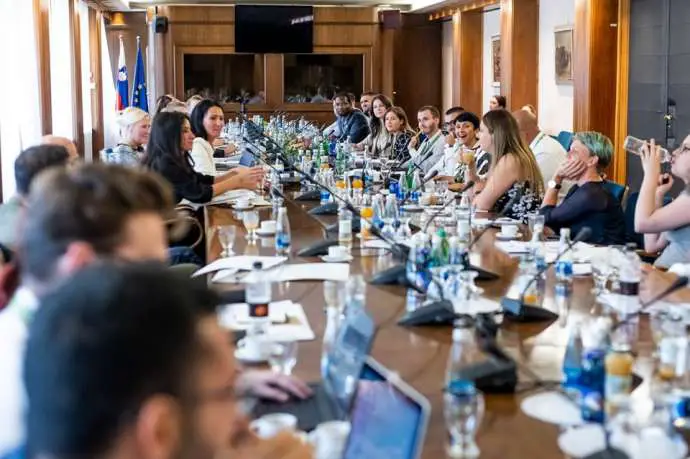STA, 2 September 2019 - The Bled Strategic Forum, the top event on Slovenia's foreign policy calendar, opened in Bled on Monday dominated by calls for action on climate change and appeals to multilateralism. The focus was on the challenges the EU faces and the role it could and should play in the new world order.
Slovenian Prime Minister Marjan Šarec, delivering the opening address, focused on the importance of ensuring stability and security through sustainability, and stressed that there was "an urgent need for a unified and coordinated approach towards global challenges".
According to him, clear recognition of scientific facts and immediate action are needed regarding climate change, water supplies and food security.
Šarec stressed that Slovenia was committed to a strong, cohesive and united EU, while ensuring solidarity and the highest standards of human rights and dignity.
Sustainable development was also in focus of Slovenian Foreign Minister Miro Cerar's address, who labelled sustainable development "our key priority".
Putting words into practice is the main responsibility, according to Cerar, who said that the burden of going sustainable and green should not fall on the shoulders of those who are already struggling now to cope with the changes in the globalised world.
The opening was also addressed by María Fernanda Espinosa Garcés, the president of the 73rd session of the UN General Assembly, who said that climate change was the "greatest challenge we must address".
She said that the planet had to increase the ambition towards green economy, taking immediate steps, such as public and private investments in low carbon, green jobs, otherwise the world would face instability.
Espinosa Garcés also pointed to the need to rework social contracts as there was an increasing inability of governments to protect their citizens, and to improve the health of the international system to counter the rise in nationalist sentiment.
The main panels of the first day of proceedings respectively tackled the challenges facing the EU and the current state of multilateralism.
The presidents of Slovenia and Estonia, Borut Pahor and Kersti Kaljulaid, spoke in favour of a strong EU as they discussed the future of the bloc.
Arguing that the EU was at a standstill that was unsustainable, Pahor proposed that the new European Commission and Parliament should consider initiating a constitutional process, something like the Convention on the Future of Europe in 2002 and 2003.
Kaljulaid agreed in principle but also suggested that the underlying question of whether the EU was useful or efficient might be misguided, especially if one tried to imagine what it would be like without the EU.
Two main immediate challenges for the EU were singled out: Brexit and migrations, issues that the Slovenian president said needed to be addressed if the EU was to be capable of dealing with more strategic questions.
A ministerial panel on multilateralism showed that multilateralism is under attack and that it can survive only if a concerted action is taken and global cooperation is maintained in order to tackle relevant challenges, including nationalism and narrow interests.
The notion that multilateralism is "under severe attack" was presented by Slovenian Foreign Minister Cerar, who said that some leaders were making mistakes by thinking that complex issues could be resolved by simple means.
"There are so many knots around the world that should be untied by diplomatic means, and they should not be simply cut," added Cerar.
Turkey's Foreign Minister Mevlüt Cavusoglu presented a nuanced picture of multilateralism, saying that his country was not moving away from European alliances.
"Doing business with one country does not mean that you are moving away from other parts of the world," he said, while criticising western allies for sometimes not providing assistance when needed.
His Spanish counterpart Josep Borrell Fontelles wondered how Europe would survive in the global world as its population is decreasing. In today's world, which he called "a world of G2 - China and the US", more stability would be provided by another superpower, with Europe having the capacity and economy for that, but only if it was united.






